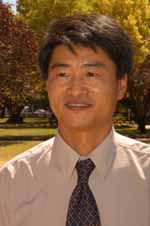A research team from Australia’s Charles Sturt University (CSU) and China’s Taishan Medical College has given hope of improved treatment for the victims of heart attacks.
 The collaborative study, led by CSU Professor of Clinical Pharmacology, Lexin Wang has demonstrated the beneficial effect of the naturally occurring amino acid, known as L-carnitine, in diminishing the heart muscle injuries in patients suffering acute heart attack.
The collaborative study, led by CSU Professor of Clinical Pharmacology, Lexin Wang has demonstrated the beneficial effect of the naturally occurring amino acid, known as L-carnitine, in diminishing the heart muscle injuries in patients suffering acute heart attack.The project involved the study of almost 100 patients between November 2005 and December 2006, who were admitted to Liaocheng People’s Hospital, a major teaching hospital, and the Clinical School of Taishan Medical College, both in China’s Shandong Province.
All the patients underwent percutaneous coronary intervention (PCI), commonly known as coronary angioplasty, within 24 hours of the onset of their chest pain. Divided into two groups, one received L- carnitine intravenously while the other received none as is the current treatment after a PCI.
“While angioplasty is a very effective treatment for heart attack by opening up blocked coronary arteries, there are injuries to the heart muscle occurring in some patients when the blocked arteries are re-opened. Some patients still develop heart failure, arrhythmias or cardiac arrest after apparently successful angioplasty,” said Professor Wang.
“We have shown with this study that L-carnitine diminishes the injuries associated with angioplasty and therefore helps to prevent the adverse effects from the catheter treatment and ultimately improve overall outcomes for patients.”
L-carnitine is found naturally in red meats and dairy products and is used in Australia and internationally as a nutritional supplement to lose fat and to improve exercise performance.
“What L-carnitine does to skeletal muscle also seems to help with the preservation of cardiac muscles from injuries caused by a reduction in blood flow” said the CSU academic.
“L-carnitine is potentially a very effective adjunct treatment to angioplasty. There is now a need for larger clinical trials to investigate the effect of L-carnitine on cardiac events following a PCI,” Professor Wang said.
CSU and Liaocheng People’s Hospital last year signed a Memorandum of Understanding to establish a strategic alliance, known as the CSU-LPH Cardiovascular Research Centre.
Professor Wang lectures in the University’s School of Biomedical Sciences based in Wagga Wagga and is head of CSU’s Cardiovascular Research Group. He holds an Honorary Professor of Cardiology at LPH and currently directs the CSU-LPH Cardiovascular Research Centre.
The results of the research were originally published in an international journal, Cardiovascular Drugs and Therapy in December 2007.





Social
Explore the world of social